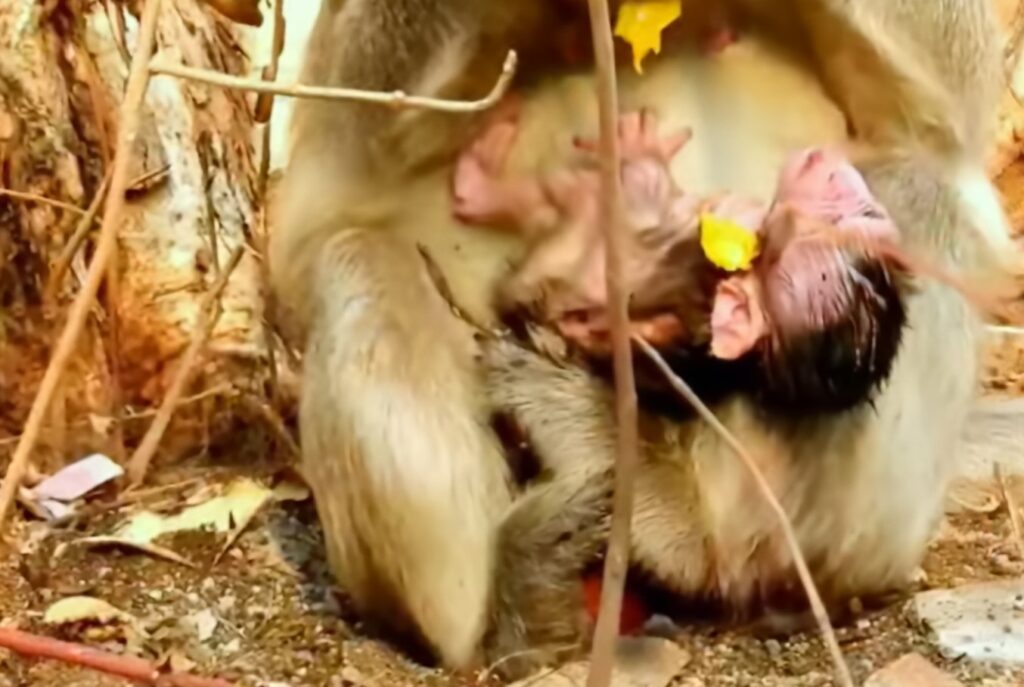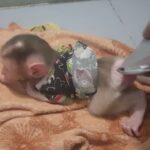In the dense, sun-dappled jungles of Southeast Asia, where towering trees whispered with the wind and vibrant birds filled the air with song, a tiny, helpless creature struggled to survive. He was just a baby monkey, frail and abandoned, his fur matted with dust, his ribs visible beneath his thin coat. The world was vast and unkind, and he had been left to fend for himself, too weak to forage, too small to defend against lurking predators.
No one knew why he had been abandoned. Perhaps his mother had been lost to a predator, or maybe she had rejected him due to his weakness—nature could be cruel that way. Regardless of the cause, the baby monkey faced a grim fate, his tiny body trembling from hunger and fear.
Yet, fate had something else in store for him.
A troop of monkeys moved through the forest, their calls echoing across the canopy as they foraged for fruits and insects. Among them was a mother monkey named Rina, whose own baby had been taken by a hunting hawk just weeks before. Her grief was profound, her maternal instincts left unfulfilled. She still carried traces of milk in her body, and her heart ached for the warmth of a child nestled against her chest.
As the troop traveled, Rina noticed the abandoned baby. He lay curled under the roots of a towering fig tree, his tiny limbs limp, his breath shallow. Her heart pounded in her chest. Something about him—the way his eyes, wide and sorrowful, locked onto hers—stirred something deep within her.
She hesitated only a moment before reaching down, scooping him up with gentle hands. The baby monkey flinched at first, startled by her touch, but the warmth of her body, the soothing sound of her heartbeat, quickly eased his fear. He clung to her instinctively, pressing his face into her soft fur.
The other monkeys watched curiously. It was not unheard of for a female monkey to adopt an orphan, but it was rare. Would the troop accept this frail outsider? Would they allow him to become part of their family? The dominant male sniffed the baby, his sharp eyes assessing the tiny creature. For a long, tense moment, the fate of the orphan hung in the balance. Then, with a grunt of indifference, the leader turned away, signaling his acceptance. The baby would be allowed to stay.

From that moment on, the little monkey’s life changed. Rina cared for him as if he were her own. She nursed him with what little milk she had left, groomed his fur until it shone, and carried him on her back as they traveled through the jungle. Under her care, he grew stronger, his tiny body filling out, his spirit reviving. He learned to forage, to climb, to chatter excitedly with the other young monkeys. Slowly, he became part of the troop, no longer an outsider but a cherished member of the family.
For Rina, the bond with the baby brought healing. The loss of her own child had left a void in her heart, but this orphan, this second chance at motherhood, gave her purpose once more. She found joy in his laughter, pride in his first leaps from branch to branch. In giving him a home, she had found solace for her own pain.
Nature is often depicted as harsh and indifferent, and yet, within its cruelty, moments of profound kindness and love can emerge. The baby monkey, once doomed to a lonely and tragic fate, had been given a second chance—an unexpected embrace from a mother who had lost her own. And in that embrace, both found the warmth, the love, and the family they so desperately needed.
The jungle continued its endless rhythm, the leaves rustling in the breeze, the sun filtering through the dense canopy. But for one tiny monkey, wrapped in the protective arms of his new mother, the world had become a place of hope once.

